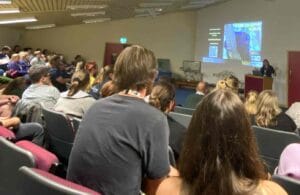Antelope are a fascinating and highly diverse group of over 90 species, varying greatly in size and conservation status. Several species currently face a critical risk of extinction in the near future. This precarious status means that the welfare and management of captive populations is more important than ever.
Wild Welfare’s Animal Welfare Field Manager, Sarah Bonser-Blake was recently invited to speak at the 2025 Antelope Conference held at Marwell Zoo in the UK. Over 70 delegates from around the world gathered together to collate their vast experience and knowledge on the management of captive antelope, strengthening the collective expertise needed to secure the future for this highly diverse and critically vulnerable group of species.
 The event gave Sarah the opportunity to highlight some of the commonalities and potential issues she has observed within captive antelope management at facilities across the world. The presentation highlighted just some of the areas where Wild Welfare has worked to promote opportunities for improving husbandry management techniques and species-specific care and safety considerations globally.
The event gave Sarah the opportunity to highlight some of the commonalities and potential issues she has observed within captive antelope management at facilities across the world. The presentation highlighted just some of the areas where Wild Welfare has worked to promote opportunities for improving husbandry management techniques and species-specific care and safety considerations globally.
“It is hoped that key observations and insights compiled through our extensive fieldwork, may hold the key to finding more ways to drive forward animal welfare improvements internationally” Sarah expressed. “It is however vital that caregivers always tailor these recommendations to the needs and circumstances of each individual animal under their care, ensuring the welfare of each animal remains the primary focus”.
A focal hot-topic that ran throughout the conference was that of the intrinsic link between conservation and exemplary captive care. Successful reintroduction programmes for critically endangered species such as the scimitar-horned oryx, mountain bongo, giant eland and addax, highlight the importance of providing these species with the highest levels of care and welfare within a captive environment. Providing these animals with purposeful and good lives is more than an ethical tick-box consideration; but a corner-stone upon which future conservation efforts rely on.

Scimitar-horned oryx
The global importance of this work means that Wild Welfare must continuously update and validate its field advice with the latest scientific data. “Every training session or piece of advice Wild Welfare delivers to our partner zoos, rescue centres or sanctuaries needs to be grounded in the most accurate and up-to-date, scientifically validated knowledge. This diligence ensures that our resources are deployed effectively to achieve the best possible welfare outcomes for captive wild animals. Explained Simon Marsh, Director at Wild Welfare. “This conference offered Sarah a great opportunity for Continued Professional Development, to gain new technical knowledge that can be taken into the field and shared with other antelope carers”, added Simon.
“I found the talk about antelope dentistry particularly fascinating. It made me aware of common antelope dental issues and associated welfare considerations” Sarah added. “A talk by Dr. Paul Rose also beautifully reinforced the principles of antelope ecology that can be used to help us prioritise welfare.”
Wild Welfare extended their heartfelt gratitude to the conference organisers for the invitation to present and learn from the expertise of many other attendees. Shared knowledge allows Wild Welfare’s team to deliver the most effective support to caregivers worldwide, inspiring a culture of care and compassion for all animals.
ENDS
Wild Welfare is devoted to improving the welfare of captive animals across the world. You can support our efforts by sharing this article, signing up to our newsletter, following our social media accounts (Facebook and Instagram), or by making an online donation. Every small contribution can help us to develop our vital accessible animal resources. Thank you.
Notes to Editors
For more information or interview requests please contact Wild Welfare on communications@wildwelfare.org
Wild Welfare is a global organisation committed to improving animal welfare for captive wild animals. By uniting the world’s leading zoos, zoo associations and animal welfare organisations, we build trusting partnerships that help provide long-term solutions to critical wild animal welfare issues.
Our vision is to end the suffering of captive wild animals around the world and ensure full and sustainable protection is given to all animals in human care. Find out more at wildwelfare.org. Registered charity in England (no.1165941).









Discussion about this post